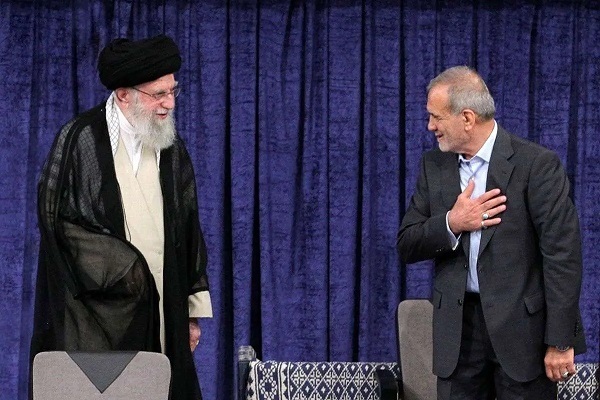
In an interview with American host Tucker Carlson, Iranian President Masoud Pezekian said: I was in a meeting where we were talking about ways to progress, but thanks to information from their spies, they tried to bomb the meeting place. But as I said before, everyone’s death depends on God’s will; and I emphasize again that we are not afraid of martyrdom and sacrifice for the people and our independence.
This is while US President Donald Trump, during the joint US-Zionist war against Iran, claimed on the social network Truth Social: “We know exactly where the so-called ‘Supreme Leader’ is hiding. He is an easy target, but he is safe there. We do not intend to eliminate (kill) him, at least not for now.” He also claimed “unconditional surrender.”
In fact, the US effort to assassinate Iranian political officials is in line with supporting state terrorism. The Islamic Republic of Iran's mission to the United Nations had stated in this regard: "The United States and the Zionist regime have openly threatened to assassinate the Supreme Leader. This criminal act is a clear example of state terrorism that should not be allowed to be made."
The Iranian delegation added: "This gross violation of international law and the Charter was brought to the attention of the Secretary-General, the President of the Security Council, and the President of the General Assembly, so that they can fulfill their legal duty to confront such provocative and criminal statements."
It should be noted that the threat of assassination of political and religious figures, especially high-ranking officials of a member state of the United Nations, is a clear violation of the peremptory norms of international law.
Terrorism is recognized as an illegal act in international law. Article 2, paragraph 4, of the Charter of the United Nations states that: “All Members shall refrain in their international relations from the threat or use of force against the territorial integrity or political independence of any state, or in any other manner inconsistent with the Purposes of the United Nations.”
Article 2, paragraph 4, of the Charter of the United Nations states that the threat or use of force against the territorial integrity or political independence is prohibited. This prohibition also includes the assassination of political figures.
On the other hand, the assassination of political figures is a clear violation of human rights. The Universal Declaration of Human Rights and the International Covenant on Civil and Political Rights emphasize the right to life, and terrorism is considered a violation of this fundamental right.
Based on international norms threats and assassinations of official and religious figures and also base on some rules contained in the Rome Statute (1998), direct incitement to commit murder and assassination, if accompanied by criminal intent, a specific target, and takes on dimensions beyond the assassination of a person, is capable of criminal prosecution and removes the immunity of the perpetrators of these actions.
On the other hand, the threat to assassinate Iranian political (religious) officials is in conflict with international laws such as the Fourth Geneva Convention, the First Additional Protocol, and the principles of humanitarian law based on the immunity of religious figures and high religious leaders, and Article 20 of the International Covenant on Civil and Political Rights, which strictly prohibits and illegalizes any incitement to violence and murder based on political views or religious beliefs. In practice, the instigators and supporters of such crimes are liable to prosecution in international courts for threatening international peace and security.
In the Covenant on Civil and Political Rights, Article 20 states: “Any incitement to national, racial, or religious hatred that incites discrimination, hostility, or the use of force shall be prohibited by law.” This prohibition concerns the religious dimension of the Leader of the Revolution, because in a religious society, authority in the era of occultation is the highest religious and social position. If someone makes such a threat, they are in fact inciting and inciting religious hatred and enmity, which is prohibited by the Covenant.
Accordingly, Iran should pursue this gross violation of international law through international legal authorities so that such provocative and criminal statements can be dealt with legally.